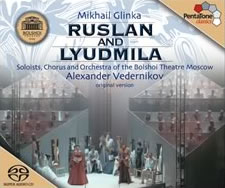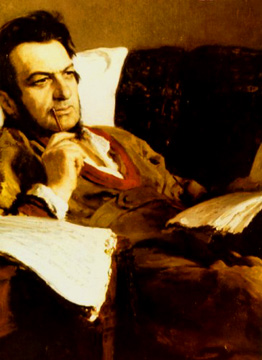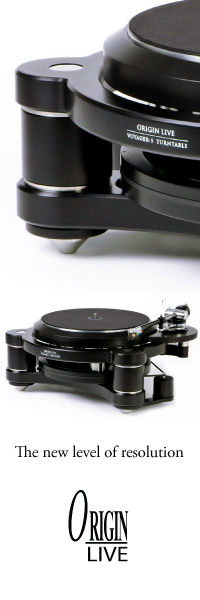Mikhail Glinka: Ruslan and Lyudmila
|
Mikhail Glinka: Ruslan and Lyudmila, Alexander Vedernikov conducting Soloists, Chorus and Orchestra of the Bolshoi Theatre, Moscow |
| Russell Lichter |
|
May 2004 |

What an absolutely wonderful recording! I love everything about it, the music, the performances, the sound quality, the acoustics of the venue. And me with a long-standing, shall we say, indifference to opera as such. No, I am not of that rather specialized, fanatical breed called opera lover. And looked at in a certain way, I’ve no business commenting on opera when I know next to nothing about opera. I run to Mozart’s masterpieces, Don Giovanni, Cosi fan tutti, Le Nozze di Figaro, Die Zaubflöte, but I don’t follow the librettos like the cognoscenti, nor go starry-eyed at the names Bartoli or Jo or Terfel. I am an outsider, unschooled, unrefined, of dubious taste, when it comes to sopranos, tenors and such like fauna. You’ll sooner find me home watching a Poirot episode than slicked up and suited down in third row center at Davies, swooning to Madame Butterfly. Whether my dabbling in piano transcriptions of Wagner (Glenn Gould and Chitose Okashiro) will ever lead to a serious interest in his embarrassingly long operas about blue-eyed Northern European heroes and heroines I doubt. Norse gods and Rhine maidens are a bit rich for my blood. (And I’m too inclined enjoy Mark Twain’s comment that Wagner’s music is a lot better than it sounds.) Now, if you, unlike me, are an opera lover, particularly a knowledgeable opera lover, you are going to find slim pickings herein. But I so enjoyed this three-disc set ― sat through the whole thing in one go and have listened to it several times since ― that I wanted to share my impressions.

Portrait of Mikhail Glinka by Ilya Repin, 1887
Glinka is a composer I’d certainly heard of before, but I don’t think I was familiar with any of his music, until now. Of course you never know: he wrote very beautiful melodies and one may well have cropped up in some Hollywood romance of the forties. The original score for this bel canto “fairy” opera had historically been considered to have perished in a St. Petersburg fire in 1859. The Circus Theatre, that housed autograph scores of many operas, was destroyed on a winter evening that year. The Bolshoi Theater directors decided to pursue all clues to try to locate an authentic original score, which was generally believed not to exist. Through perseverance and ingenious detective work Yevgeny Levachev and Nadezhda Teterina eventually found an authentic score to Berlin. That makes this the first time in almost 150 years that there has been a performance of Ruslan and Lyudmila exactly as Mikhail Glinka intended it.
Fortunately, Pentatone and Polyhymnia (producer Job Maarse, engineers Jean-Marie Geijsen, Erdo Groot and Roger de Schot) were in Moscow to record this very special performance in splendid DSD (though I am able to hear only the hybrid, PCM layer). The recording itself has some of the characteristics of the very best of Mercury’s Living Presence series, that special sense of realism I associate with a warm, intimate, less-reverberant venue, and a certain humility in the use and placement of microphones.
For this performance Maestro Vedernikov modified the Bolshoi Theatre Orchestra to reflect the instrumentation at the time of the opera’s first performance, employing period brass, piano and harp and a reduced string section, as well as two glass harmonica players flown in from Siberia. Russian singers seem to have a characteristic sonority I have always loved, particularly tenors and basses. I remember first noticing this on an LP of the Red Army Choir. And the singers on this recording are relatively young, with lighter, less studied voices. I confess to a weakness for multi-part vocal writing, and there are some glorious examples in Ruslan and Lyudmila. The orchestra is given unusual importance, with lengthy passages of it own, sometimes strikingly simple, sometimes simply brilliant and often very moving. The orchestration seems to me quite idiosyncratic at times, but there is a confidence behind it that is nothing short of genius. And I noted how the chorus is used in a classical sense, as both a participant and commentator on the action. The overall effect is so very characteristically Russian. You find it in novels and poems and films, as well as music: spacious, clean, straightforward, breathing the air and treading the soil of the bogatyri of ancient Rus, yet in the case of this opera moving forward without ponderousness or pomp. The brains of the outfit characterized this recording: Full of chocolate syrup, deep, dark and rich. Apt.
I must say, Pentatone has rendered the world of recorded opera a signal service.
Russelllichter@Stereotimes.com.
![]()
Don’t forget to bookmark us! (CTRL-SHFT-D)
Stereo Times Masthead
Publisher/Founder
Clement Perry
Editor
Dave Thomas
Senior Editors
Frank Alles, Mike Girardi, Russell Lichter, Terry London, Moreno Mitchell, Paul Szabady, Bill Wells, Mike Wright, and Stephen Yan,
Current Contributors
David Abramson, Tim Barrall, Dave Allison, Ron Cook, Lewis Dardick, John Hoffman, Dan Secula, Don Shaulis, Greg Simmons, Eric Teh, Greg Voth, Richard Willie, Ed Van Winkle, Rob Dockery, Richard Doran, and Daveed Turek
Site Management Clement Perry
Ad Designer: Martin Perry





Be the first to comment on: Mikhail Glinka: Ruslan and Lyudmila